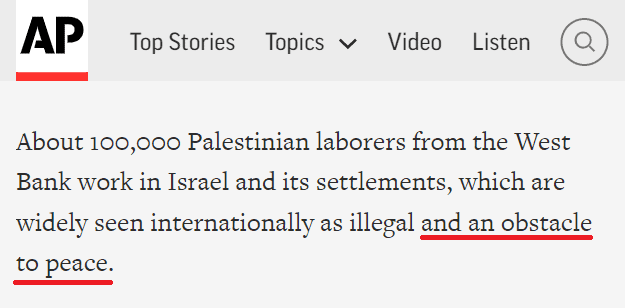No matter one’s personal opinion about Jewish communities located in the West Bank, that much of the international community views the matter differently to the Israeli government is an objective truth. In fact, most countries regard the towns, villages and outposts collectively known as “the settlements” as illegal under international law, a position that, as a result, is constantly conveyed in the media.
But is the presence of Israeli civilians in territory claimed by the Palestinians an obstacle to peace? While news agencies often attribute this claim to a specific party — such as the Palestinian leadership, a foreign government, or the UN, for example — a recent Associated Press (AP) report by Laurie Kellman is evidence that the narrative is becoming increasingly entrenched and over-simplified.

As is common with stories published by news agencies, the article was republished by various well-known media outlets, including the Washington Post, subsidiaries of NBC News and ABC News, and even the English version of Israeli site Ynet.
What Exactly is an Obstacle to Peace?
A review of dozens of AP articles over the last few years shows that the organization typically broaches the subject of Israeli communities in the territories by mentioning that settlements are considered illegal by much of “the international community,” and stories have repeatedly mentioned the phrase “obstacle to peace” in the context of a specific party regarding Israel’s settlements as such.
For example, an AP article in November 2020 declared the “Trump administration’s acceptance of Israeli settlements, which the Palestinians and most of the international community view as a violation of international law and a major obstacle to peace.”
Another AP article from the same month described the “Trump administration’s acceptance of Israeli settlements, which the Palestinians and most of the international community view as a violation of international law and a major obstacle to peace.”
Similarly, an AP article in February of that year stated, “The Palestinians view the settlements in the West Bank and annexed east Jerusalem — territories seized by Israel in the 1967 war — as a major obstacle to peace. That position is held by much of the international community, which views the settlements as illegal.”
But what, however, constitutes an obstacle to peace? A Google search of the AP website for the term “obstacle to peace” yields thousands of results, yet few, if any, appear to discuss a Palestinian policy that might be regarded in the same light as Israeli settlements.
This is of real significance because public perceptions of the Israeli-Palestinian conflict, specifically, and of the Jewish state, more broadly, are informed by this kind of framing. Indeed, there are numerous other issues that the AP could reasonably describe as an obstacle to peace, or at the very least describe them as being regarded as obstacles by Israel, foreign governments or the international community.
Here is a partial list:
The “Right of Return”
The vast majority of “Palestinian refugees” in Jordan that are assisted by the United Nations Relief and Works Agency are, in reality, Jordanian citizens. They are not refugees according to the UN definition applied to all other displaced people. Only Palestinians are designated as refugees after receiving citizenship in other countries, or even when they were never born in the country to which they seek to “return.”
There is simply no right under international law for literally millions of people descended from the estimated 800,000 Arabs who left their homes during the 1948 war to be absorbed into Israel. The vast majority are not “refugees” at all, and insisting that they have a right to be absorbed into what is now Israel makes peace considerably harder, if not impossible, to achieve. In truth, the “right of return” may well be a euphemism for the end of Jewish self-determination, a proposition repeatedly promoted in the media under various guises.
Hamas Rule of Gaza
Hamas, widely designated as a terrorist organization, has a genocidal charter that calls for the killing of Jews. It maintains a modus operandi of launching rockets at Israeli population centers and has a history of dispatching gunmen and suicide bombers into Israeli cities with the sole purpose of murdering civilians on buses, on the streets, and in restaurants, cafes and malls. That Hamas, which rules the Gaza Strip’s approximately 2 million residents, on principle rejects the existence of Israel and is committed to destroying it should speak volumes about the prospect of ending the Israeli-Palestinian conflict. Though commentators in recent years have described Hamas as becoming more “pragmatic” and “moderating its talk”, it remains at its root an extremist organization.
The Intra-Palestinian Divide
While Hamas rules Gaza, the Palestinian Authority, currently controlled by Fatah, governs Palestinians in the West Bank. While the two groups have occasionally sought to work with each other, their 15-years-long rivalry has, in practice, essentially left the West Bank and Gaza as two separate entities. And whereas both sides have ostensibly agreed to hold joint Palestinian parliamentary and presidential elections for the first time since 2005 and 2006, respectively, it is far from clear that this will actually materialize.
Even then, it is difficult to envision any type of fully functional unity government being formed; that is, at least one that can actually cooperate — never mind make peace — with Israel. Moreover, numerous other terrorist groups such as the Iranian-backed Islamic Jihad are also capable of torpedoing any potential peace process. The fundamental fragmentation of Palestinian factions, and, consequently the Palestinian populace, too, surely an obstacle to peace.
Incitement to Violence and ‘Pay For Slay’
According to Palestinian Media Watch (PMW), the Palestinian Authority paid more than NIS 512 million (US$157 million) in salaries to terrorist prisoners in 2020. Due to a lack of transparency, the amounts paid to the families of these “martyrs” is not public knowledge. However, in 2017 the Washington Post reported that the PA had paid $183 million to relatives of Palestinian terrorists and $160 million directly to prisoners involved in terror attacks.
With Palestinian schools, town squares, and even sporting events being named after “glorious resistance fighters” who murdered Israelis, and with television programs, news articles and school books routinely praising and encouraging further acts of violence, the ongoing incitement to and incentivization of terorism represent a heinous — and obvious — obstacle to peace. The media have a duty to recognize it as such.
Recognition of Israel as a Jewish State
Lastly, former PA prime minister Salam Fayyad recently declared that Palestinians should reject basic principles put forward by the international community as a basis for peace, including recognition of Israel, abiding by previous diplomatic agreements with it, and renouncing violence. This significant development should have been covered by the media. Regrettably, his statements were widely ignored.
The ongoing refusal of Palestinian officials to recognize the Jewish people’s right to live in their ancestral homeland has more than symbolic meaning — it indicates a refusal to coexist alongside Israel. The Palestinian refusal to live side-by-side in peace with Israel is perhaps the most significant, yet least discussed, obstacle to solving the conflict.
Featured Image: Getty


